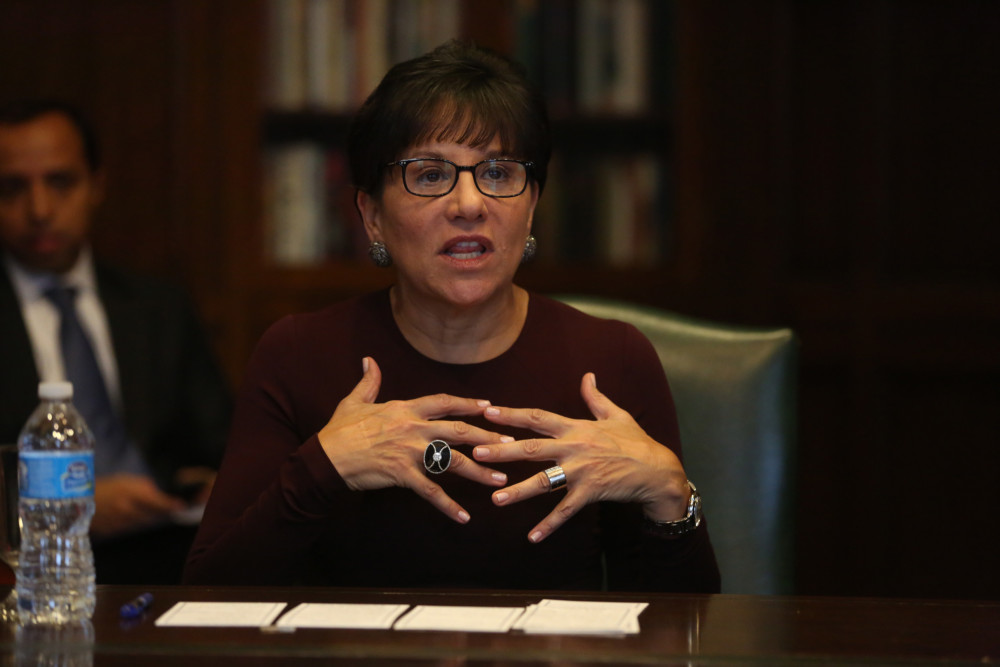By Ally Marotti
Chicago Tribune
WWR Article Summary (tl;dr) As commerce secretary, Pritzker led technology policy initiatives for the Obama administration, and she said she saw how other cities are incorporating technology and entrepreneurship into their economies. She wants to do the same for Chicago.
Chicago Tribune
Penny Pritzker, the former U.S. commerce secretary and a billionaire heir of the Hyatt Hotel fortune, is rolling out an initiative aimed at boosting Chicago’s standing among the world’s tech cities.
The Chicago area has some real assets when it comes to the technology industry, such as universities that churn out research and engineering talent, Pritzker said. But obstacles remain in the city’s effort to become a leading tech center.
One major problem is convincing those newly minted programmers and other tech workers to stay in the area instead of leaving for jobs in Silicon Valley, New York or Boston, which often rank ahead of Chicago on lists of the best places for tech employment.
In Chicago’s diverse economy, leaders from a variety of industries and universities must also help fix those problems, she said.
“As a business environment, if you aren’t either a technology company or becoming a technology company, you’re going to struggle to compete,” said Pritzker, who is leading the initiative with Chicago entrepreneur Chris Gladwin.
While no money has been pledged to the effort, more than 120 business, civic and university leaders have volunteered to join the initiative, called P33, she said. The “p” is for people, planning and preparedness.
The “33” nods to Chicago’s 1933 Century of Progress World’s Fair and 2033, in an effort to look 15 years into Chicago’s future. The initiative plans to create a blueprint for addressing the problems holding Chicago’s tech sector back, Pritzker said.
Besides figuring out ways to keep tech talent from leaving, she said, the initiative will look into better capitalizing on research and development taking place at Chicago’s universities and evaluate how local startups are funded, among other efforts.
P33 is one of Pritzker’s first big public endeavors since coming back to Chicago after her stint as commerce secretary ended nearly two years ago. It also comes as Amazon narrows its search for a planned second headquarters, dubbed HQ2, with up to 50,000 jobs. Amazon was back in Chicago in August to take another look at a South Loop site along the river.
Pritzker helped in Chicago’s efforts to woo the e-commerce giant and sat on a 600-member committee formed to support the city’s Amazon bid.
As commerce secretary, Pritzker led technology policy initiatives for the Obama administration, and she said she saw how other cities are incorporating technology and entrepreneurship into their economies. Additionally, her private investment firm, PSP Partners, invests in software companies.
The tech interest runs in the family. Her brother, Democratic candidate for governor J.B. Pritzker, backed the founding of prominent Chicago tech hub 1871 and the locally active Pritzker Group Venture Capital firm.
This isn’t the first time efforts have been made to increase Chicago’s standing in the tech universe. Chicago-area companies, both in the technology industry and outside of it, realize they need to do more to recruit tech talent. Competition for potential employees is fierce, and well-known Silicon Valley giants like Google and Facebook have more visibility with soon-to-be graduates.
But the P33 initiative will build on previous efforts, not compete with them, said Kelly Welsh, president of the Civic Committee of the Commercial Club of Chicago. Leaders from Fortune 500 companies, universities and the tech industry bring different perspectives to the same problems, Welsh said.
“They all talk about this challenge and all recognize that it’s an important one, but at the same time they talk about it in a little bit different way,” he said. “Bringing those people together so they can talk together about that issue I think is going to produce better answers.”
Amanda Lannert, CEO of Chicago-based software company Jellyvision, said she goes to a lot of tech industry “hype events.” She knew P33 was different as soon as she walked into her first meeting.
“The reason I’m interested in this is it is not sponsored by the mayor,” Lannert said. “The private sector finally is stepping up and saying, ‘What can we do to facilitate more collaboration, to raise our profiles?’ ” she said.
It’s the cross-industry collaboration that is going to make this work, said Gladwin, CEO and co-founder of Chicago-based software company Ocient.
Gladwin first brought the idea for the initiative to Pritzker. After he sold his company Cleversafe to IBM for $1.3 billion in 2015, he assessed what it would take to vault Chicago to a more prominent standing among the world’s tech cities, he said. The key is not the technology industry winning a bigger chunk of Chicago’s economy; it’s about making sure technology is being implemented in every industry, Gladwin said.
“There are so many strengths and advantages we have, yet we could be doing better,” he said.
___
(c)2018 Chicago Tribune
Visit the Chicago Tribune at www.chicagotribune.com
Distributed by Tribune Content Agency, LLC.














































































































































































































































































































































































